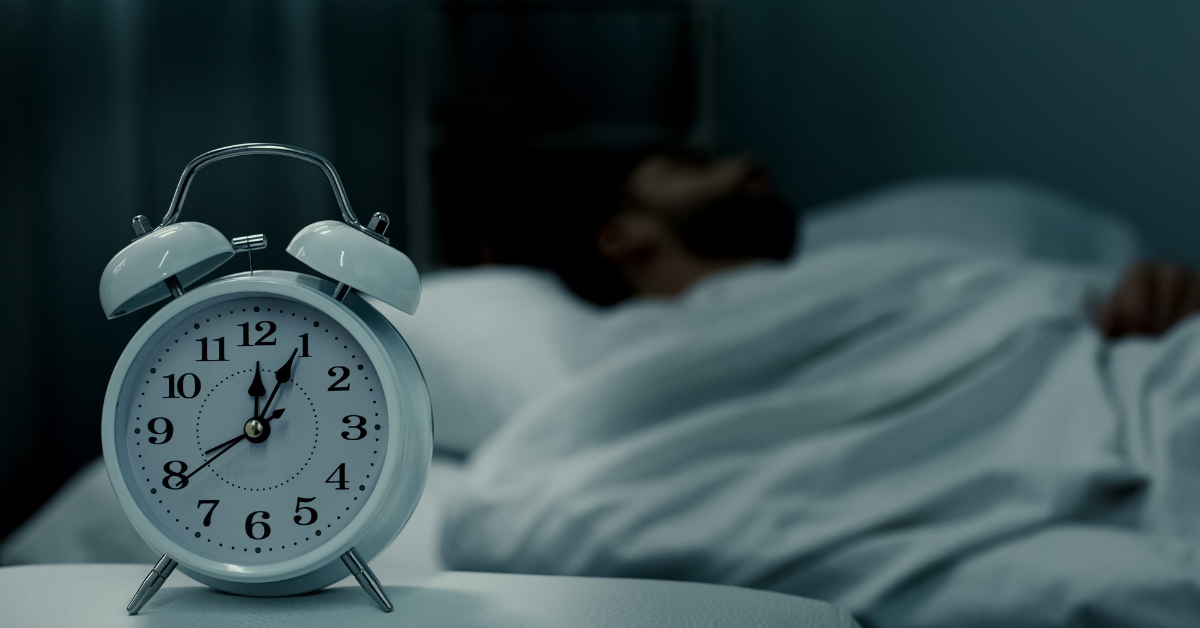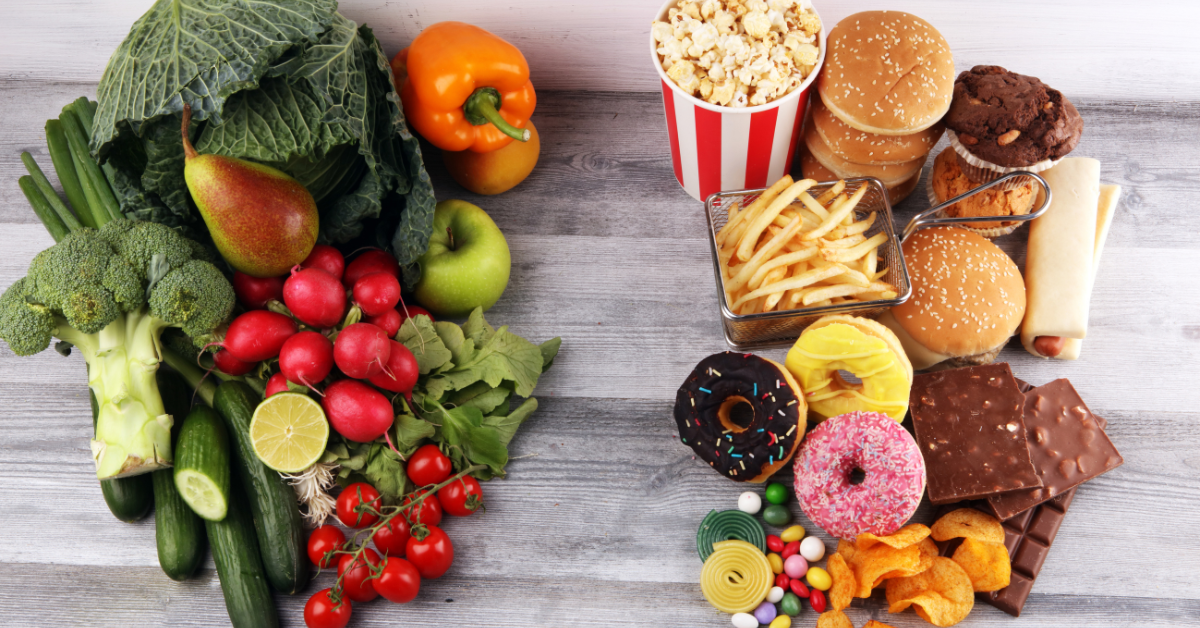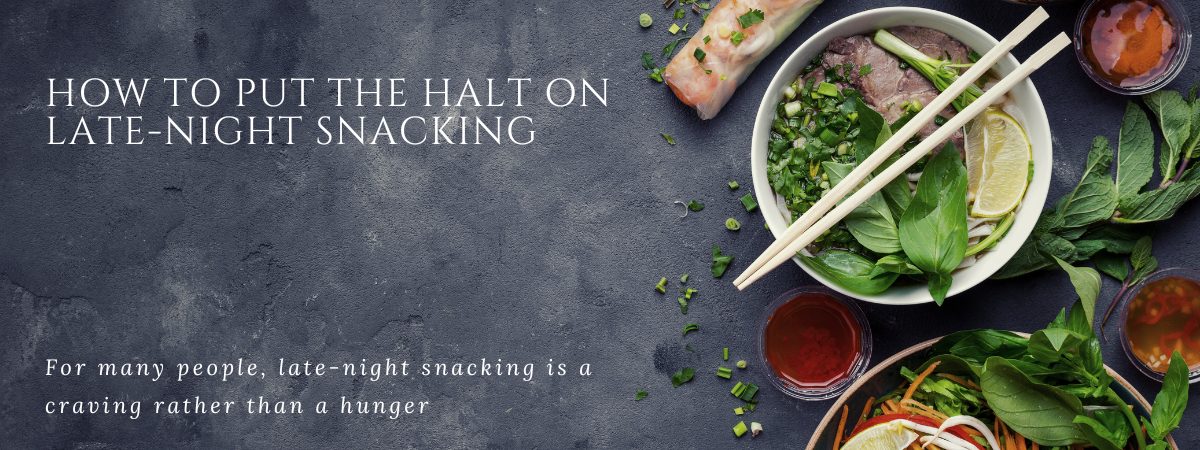
Gina Gilchrist, MS, RDN, LDN
Do you ever head straight for the fridge or find yourself poking around the pantry after dinner? Do you find yourself thinking about food while you are watching TV or scrolling on your phone at night? You are not alone! For many people, late-night snacking is a craving rather than a hunger. Excess calories late at night can lead to weight gain, disruptive sleep, depression, and overall discomfort into the night and the following day. While this is in the realm of “normal” eating from time to time, if late-night eating is becoming a habit or a problem, try some of the following strategies to avoid or be better prepared for your next late-night snack or hunger attack.
Identify the Problem and Your Triggers
To change this habit, you need to identify the cause of the problem and your triggers. Nighttime eating may be the result of overly restricted or unbalanced daytime food intake, boredom, stress, and/or sleep deprivation. Nighttime eating has also been linked to some eating disorders, including binge eating disorder and nighttime eating syndrome. In both, people use food to curb emotions such as sadness, anger, or frustration, and they often eat when they are not hungry. Binge eaters also tend to eat very large amounts of food in one sitting and feel out of control when they are eating. If you think you have either of these disorders, seeking professional help and support can be key to overcoming problematic eating at night. Monitoring your behavior patterns and identifying what triggers you to eat at night will help you break the cycles of emotional eating. An idea could be keeping a “food and mood” diary to identify your triggers for eating.
Attempt to get on a structured sleeping routine!
Having set times for eating and sleeping can help you separate the two activities and keep your calories in check. Research shows that sleep deprivation can impair glucose metabolism and affect hormones linked to hunger, appetite, and body weight regulation. We often confuse hunger and tiredness, especially at night. If you’re tempted to snack after a balanced dinner, your body may be signaling that it needs to rest. Adults should strive for 7-9 hours of sleep per night. Remember to power off your devices before bed to release tension from the long day. Being on your phones within an hour of bedtime actually induces stress and causes your body to release excess cortisol, a stress hormone, which then stimulates insulin and can lead to increased appetite.

Aim for a balanced, nutritious diet throughout the day
Studies find that those with regular mealtimes (eating 3 or more times per day) have better appetite control and lower weight. Try to eat within 1 hour of waking and a healthy meal or snack of vegetables, fruits, whole grains, low fat/low sugar dairy, and protein sources about every 3-4 hours thereafter. Avoid skipping meals or going over 4 hours without a healthy meal or snack. When you get really hungry, your brain craves high-fat, high-sugar foods and you are more likely to binge. Structured eating will help you spread your food intake over the day so your metabolism remains high, your sugar levels remain stable, and you are therefore less hungry at night. Spend a bit of time planning ahead and grocery shopping for nutritious meals and snacks throughout the week. Aim to eat 20-25 grams of protein at each meal. One study found that eating frequent high-protein meals reduced cravings by 60% and cut the desire to eat at night by half. For example, a breakfast of oatmeal with a cup of fat-free milk, a small handful of nuts, and fruit can provide ~20 grams of protein. A couple of tablespoons of peanut butter (7 grams of protein), half a can of tuna (16 grams of protein), half a cup of 1% cottage cheese (14 grams), half a cup of black beans (7 grams) or 3oz of grilled chicken (27 grams) can help push up protein. Dietary fiber also helps keep us full. Find fiber in whole grains, legumes (beans and lentils), vegetables, fruits, nuts, and seeds, and include these in your dinners to avoid hunger late at night.

Keep the house a healthy zone!
Get the bottomless large bags of chips, tempting snack crackers, and ice cream bars out of the house if these are your go-to’s in the evening. Doing so will help you from snacking on it throughout the night. If you are still starving after dinner, first ask yourself: Am I hungry? Am I thirsty? Am I tired? Am I bored? Am I sad? If you have ruled out other factors, it’s OK to have a small snack, however, opt for something with protein or fiber to provide satiety and nutrients. Good choices are Greek yogurt, fruit, nuts, veggies, and hummus, and air-popped popcorn. If you’re craving dessert, keep your portion small and eat slowly without distractions. Remember, turn off the screens before picking up your fork as screen time has been linked to mindless eating and increased food intake. Eating in front of a TV or mobile device makes it harder to detect your body’s satiety signals and it also can reduce the enjoyment and mindfulness of your meal.
Distract yourself!
If you are preoccupied with thoughts of food because you’re bored, then find something else you enjoy doing in the evening to help keep your mind occupied. Read a book, give yourself a manicure, work on a crossword puzzle, take the dog for a walk, do yoga, take a bath, or try meditation, gentle exercise, or stretching. Or it may be as simple as getting out of the kitchen area entirely so you are not tempted to walk over to the fridge or pantry! Sometimes sipping on some hot tea or decaf coffee (don’t add sugar!) can be relaxing and take your mind off eating. Another strategy is brushing your teeth right after dinner to stop a craving in its tracks and put you in the mindset of “bedtime”.

Gina Gilchrist
RD, LDN
Gina Gilchrist is a Registered Dietitian with a bachelors degree in Dietetics and has 24 years of experience in varied settings, including outpatient nutrition counseling, nutrition health coaching/private practice, research, and corporate health….READ MORE


